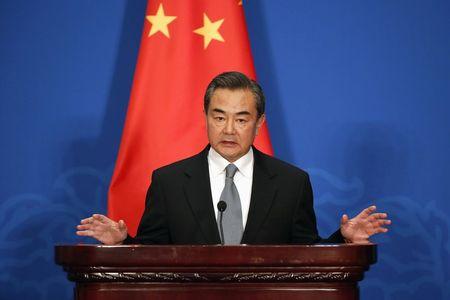
China may initiate ‘limited war’ with India
The two agreed this week to de-escalate a more than two-month-old stand-off on their disputed border, just in time for Sunday's kick-off of a summit of the BRICS grouping of nations, which also includes Brazil, Russia and South Africa. It was normal for the two giant neighbours to have differences, Wang told a news briefing ahead of the summit in the southeastern city of Xiamen that India's Narendra Modi is to attend.
"Of course we hope the Indian side will learn lessons from this incident and prevent similar things from happening again," Foreign Minister Wang Yi told a news briefing on the upcoming BRICS summit, which includes both nations as well as Brazil, Russia and South Africa.
"What's important is that we put these problems in the appropriate place, and appropriately handle and control them in the spirit of mutual respect and based on the consensus of both countries' leaders," he said. "There is huge potential for cooperation between China and India," Wang added, without giving details. The stand-off in the Himalayan region began when India sent troops to stop China building a road in the remote, uninhabited territory of Doklam, claimed by both China and Bhutan.
China has said its forces will continue to patrol in Doklam, known in Chinese as Donglang, and Wang added that he hoped India had learned a lesson from the incident. India and China have deep historical and cultural connections, but relations have seesawed since they fought a brief border war in 1962. Modi refused to join President Xi Jinping's signature Belt and Road initiative to knit together Asia and beyond, making India the lone country to boycott a summit in Beijing in May.
China warns India over longest bridge on border
Besides the festering border dispute, which also covers areas at the other end of the frontier close to Pakistan, China and India have a series of disagreements. India is deeply suspicious of China's close relationship with arch rival Pakistan, and of its growing military activities in and around the Indian Ocean, such as its first overseas
military base in Djibouti. In recent months India has upset China over the exiled Tibetan spiritual leader the Dalai Lama, who lives in India and is reviled by Beijing as a separatist.
The Dalai Lama says he simply wants genuine autonomy for Tibet. In April, Beijing bristled at a week-long trip by the Dalai Lama to Arunachal Pradesh, an eastern Himalayan region administered by New Delhi but claimed by China as "southern Tibet".









1732354127-0/Untitled-design-(3)1732354127-0-270x192.webp)







COMMENTS (5)
Comments are moderated and generally will be posted if they are on-topic and not abusive.
For more information, please see our Comments FAQ